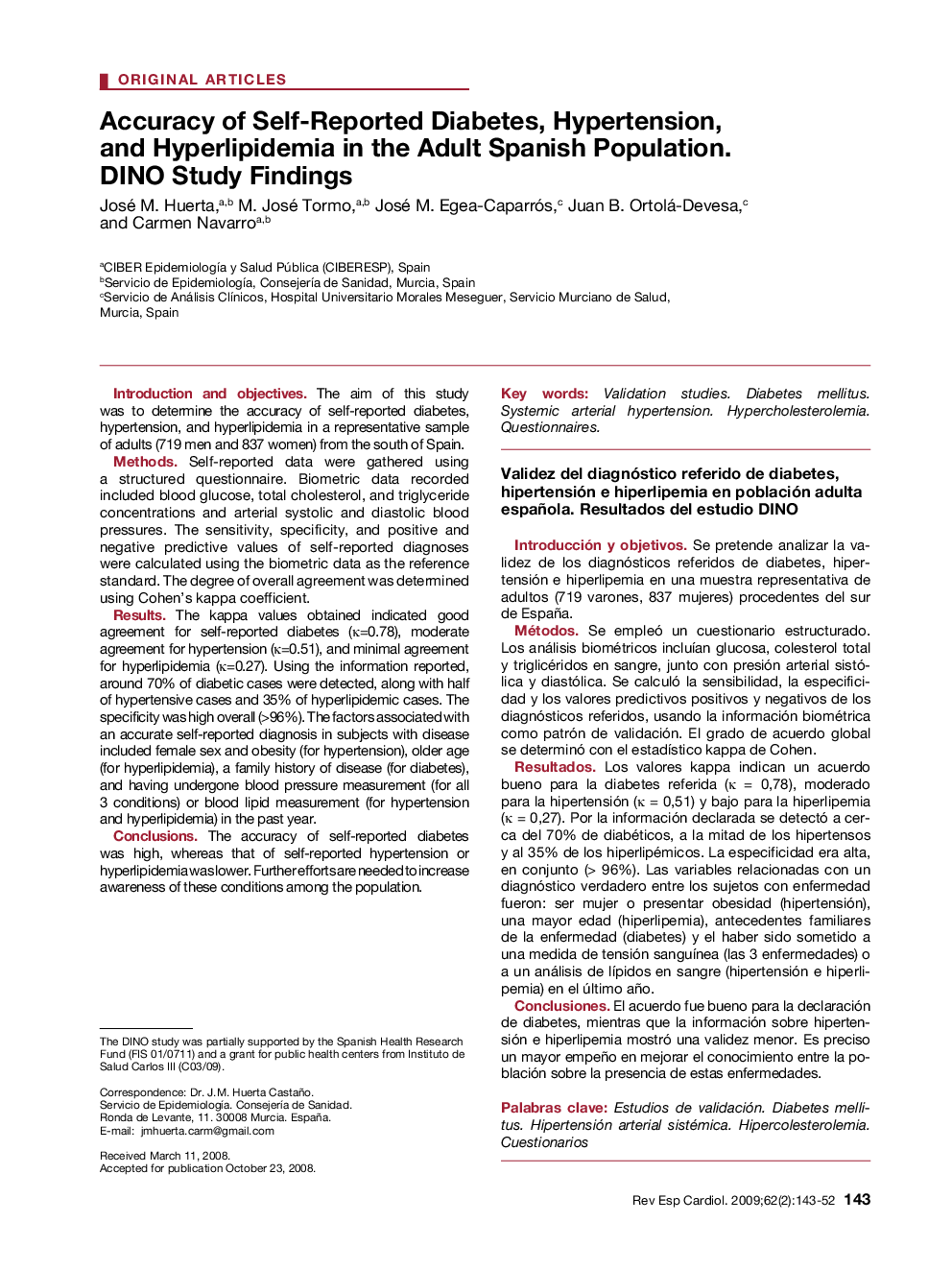| Article ID | Journal | Published Year | Pages | File Type |
|---|---|---|---|---|
| 3019160 | Revista Española de Cardiología (English Edition) | 2009 | 10 Pages |
Introduction and objectivesThe aim of this study was to determine the accuracy of self-reported diabetes, hypertension, and hyperlipidemia in a representative sample of adults (719 men and 837 women) from the south of Spain.MethodsSelf-reported data were gathered using a structured questionnaire. Biometric data recorded included blood glucose, total cholesterol, and triglyceride concentrations and arterial systolic and diastolic blood pressures. The sensitivity, specificity, and positive and negative predictive values of self-reported diagnoses were calculated using the biometric data as the reference standard. The degree of overall agreement was determined using Cohen's kappa coefficient.ResultsThe kappa values obtained indicated good agreement for self-reported diabetes (κ=0.78), moderate agreement for hypertension (κ=0.51), and minimal agreement for hyperlipidemia (κ=0.27). Using the information reported, around 70% of diabetic cases were detected, along with half of hypertensive cases and 35% of hyperlipidemic cases. The specificity was high overall (>96%). The factors associated with an accurate self-reported diagnosis in subjects with disease included female sex and obesity (for hypertension), older age (for hyperlipidemia), a family history of disease (for diabetes), and having undergone blood pressure measurement (for all 3 conditions) or blood lipid measurement (for hypertension and hyperlipidemia) in the past year.ConclusionsThe accuracy of self-reported diabetes was high, whereas that of self-reported hypertension or hyperlipidemia was lower. Further efforts are needed to increase awareness of these conditions among the population.
Introducción y objetivosSe pretende analizar la validez de los diagnósticos referidos de diabetes, hipertensión e hiperlipemia en una muestra representativa de adultos (719 varones, 837 mujeres) procedentes del sur de España.MétodosSe empleó un cuestionario estructurado. Los análisis biométricos incluían glucosa, colesterol total y triglicéridos en sangre, junto con presión arterial sistólica y diastólica. Se calculó la sensibilidad, la especificidad y los valores predictivos positivos y negativos de los diagnósticos referidos, usando la información biométrica como patrón de validación. El grado de acuerdo global se determinó con el estadístico kappa de Cohen.ResultadosLos valores kappa indican un acuerdo bueno para la diabetes referida (κ = 0,78), moderado para la hipertensión (κ = 0,51) y bajo para la hiperlipemia (κ = 0,27). Por la información declarada se detectó a cerca del 70% de diabéticos, a la mitad de los hipertensos y al 35% de los hiperlipémicos. La especificidad era alta, en conjunto (> 96%). Las variables relacionadas con un diagnóstico verdadero entre los sujetos con enfermedad fueron: ser mujer o presentar obesidad (hipertensión), una mayor edad (hiperlipemia), antecedentes familiares de la enfermedad (diabetes) y el haber sido sometido a una medida de tensión sanguínea (las 3 enfermedades) o a un análisis de lípidos en sangre (hipertensión e hiperlipemia) en el último año.ConclusionesEl acuerdo fue bueno para la declaración de diabetes, mientras que la información sobre hipertensión e hiperlipemia mostró una validez menor. Es preciso un mayor empeño en mejorar el conocimiento entre la población sobre la presencia de estas enfermedades.
